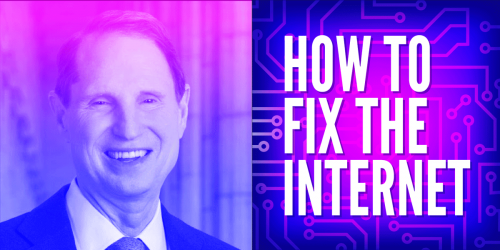As Congress considers passing an Internet censorship bill in the name of fighting sex trafficking, groups that work closely with trafficking victims have been warning Congress that the bill could put trafficking victims in even more danger. It’s essential that lawmakers listen to those groups before passing a law that could do more harm than good.
In today’s House subcommittee hearing on these proposals, Rep. John Conyers (D-MI) asked whether the Stop Enabling Sex Traffickers Act (SESTA, S. 1693) or its House counterpart, the Allow States and Victims to Fight Online Sex Trafficking Act (ASVFOSTA, H.R. 1865), would do anything to address the problem of sex trafficking.
It’s unfortunate that a small group of advocates have so successfully presented themselves as the unanimous experts on trafficking, particularly when their motivations seem to go far beyond fighting trafficking.
It’s a good question. These bills would expose any person, organization, platform, or business that hosts third-party content on the Internet to the risk of overwhelming criminal and civil liability if sex traffickers use their services. Yet there’s been little or no evidence that increased liability would do anything to reduce trafficking.
But here’s a more important question: Why is Congress asking tech lobbyists and academics what would reduce trafficking? Experts with experience working closely with trafficking victims, some who were victims themselves, have voiced major concerns that undermining Section 230 would do more harm than good for trafficking victims. Congress should talk to them.
Freedom Network USA (a national network of frontline organizations working to reduce trafficking) expresses grave concerns [.pdf] that eroding Section 230 would compromise the very tools that are most useful for finding and stopping traffickers:
Responsible website administrators can, and do, provide important data and information to support criminal investigations. Reforming [Section 230] to include the threat of civil litigation could deter responsible website administrators from trying to identify and report trafficking.
It is important to note that responsible website administration can make trafficking more visible—which can lead to increased identification. There are many cases of victims being identified online—and little doubt that without this platform, they would have not been identified. Internet sites provide a digital footprint that law enforcement can use to investigate trafficking into the sex trade, and to locate trafficking victims. When websites are shut down, the sex trade is pushed underground and sex trafficking victims are forced into even more dangerous circumstances.
Sex trafficking expert Alexandra F. Levy agrees that Section 230 enables the methods that law enforcement uses to find and prosecute traffickers:
While more visibility invites more business, it also increases the possibility that victims will be discovered by law enforcement, or anyone else looking for them. By extension, it also makes it more likely that the trafficker himself will be apprehended: exposure to customers necessarily means exposure to law enforcement.
Anti-trafficking advocate (and herself a trafficking survivor) Kristen DiAngelo points out that losing those online spaces doesn’t just thwart law enforcement; it also exposes trafficking victims to the threat of more violence [.pdf]:
SESTA would do nothing to decrease sex trafficking; in fact, it would have the opposite effect. […] When trafficking victims are pushed off of online platforms and onto the streets, we become invisible to the outside world as well as to law enforcement, thus putting us in more danger of violence.
DiAngelo goes on to tell the heartbreaking story of a woman who was forced by her pimp to work the streets after the online platform where she’d been advertising was shut down: “Her first night out, she was robbed and raped at gunpoint, and when she returned to the hotel room without her money, her pimp beat her.”
The Sex Workers Outreach Project (SWOP)—the national organization that DiAngelo and other trafficking experts work with—expresses deep concern with the consequences of opening web platforms to liability under state criminal law, as state sex trafficking laws are notoriously inconsistent.
SWOP is right, and anyone who cares about the safety of sex workers has reason to be alarmed: some state sex trafficking statutes are much broader than the federal one. In Alaska and Massachusetts, for example, statutes define trafficking so broadly that they don’t require any indication that someone was forced or coerced into sex work, the way that federal criminal law does.
It’s unfortunate that a small group of advocates have so successfully presented themselves as the unanimous experts on trafficking, particularly when their motivations seem to go far beyond fighting trafficking. TechDirt’s Mike Masnick investigated some of the voices behind SESTA and found that they seem to see it as just a step on the way to banning pornography from the Internet. Congress should realize that there are other victims’ voices in this debate.
If not this, then what?
There was a very telling moment in the House hearing when Rep. Martha Roby (R-AL) asked, “If not this, then what?” That is, if increased platform liability via SESTA and ASVFOSTA isn’t the right way to fight sex trafficking, then what steps should Congress take?
Once again, the first place Congress should go with that question isn’t the technology or academic community; it’s experts in harm reduction. From Freedom Network’s statement:
Human trafficking survivors need increased access to comprehensive services and increased accountability for the traffickers who are masterminding this exploitation. And yet every year the U.S. government provides services and support to only a fraction of the trafficking victims seeking assistance, while providers report waitlists. Survivors continue to be arrested for their victimization and mandated into counseling, while they struggle to find affordable housing and sustainable employment. Complex investigations into human trafficking networks are underfunded, human trafficking prosecutions remain woefully low, and prosecutions of labor trafficking are nearly nonexistent. We urge Congress to focus on addressing these gaps instead of misguided legal reforms which will not benefit victims or increase punishment of traffickers.
There are currently no less than 18 bills in Congress on sex trafficking. These proposals run the gamut from better support for victims to tougher enforcement against traffickers to better training and resources for law enforcement officials in finding trafficking online. These proposals deserve intense deliberation by lawmakers.
If nothing else comes from this hearing, we hope that it results in more members of Congress contemplating how laws can better address the causes of trafficking and better equip lawmakers to prosecute perpetrators.
In DiAngelo’s words, “Online posting forums and advertising platforms do not create trafficking and they will not end it.” While it may be politically savvy for Congress to pass a bill punishing online intermediaries, it won’t address the problem of sex trafficking.









